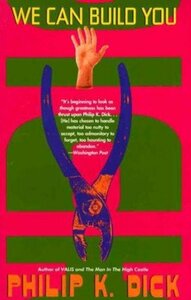Take a photo of a barcode or cover
3.5☆/5☆
okay, this book is very little "sci" and a lot of "fi"; its good, but it deals a bit too much with interpersonal relationships for my liking, at least - again - for a sci-fi genre book. otherwise... uhm. louis is just like me fr fr
okay, this book is very little "sci" and a lot of "fi"; its good, but it deals a bit too much with interpersonal relationships for my liking, at least - again - for a sci-fi genre book. otherwise... uhm. louis is just like me fr fr
challenging
mysterious
reflective
medium-paced
Plot or Character Driven:
A mix
Loveable characters:
No
Diverse cast of characters:
No
Flaws of characters a main focus:
Yes
In typical PKD fashion, the initial premise is almost immediately sidelined, and entirely abandoned by the end. I’m fine with that; it’s one of the many reasons I love PKD. However, in this case, the central plot is not particularly interesting or complex: middle-aged man becomes obsessed with an eighteen year-old girl (for reasons never really given), then stubbornly and deludedly pursues her. Again, I don’t necessarily need the reasons (I’m much more lenient on these things than conventional readers), but the treatment here was pretty flat.
The most interesting section comes at the very end, when Rosen is checked into a mental health clinic, and treated to fugue therapy. Mental health is the theme here; no surprise for any PKD veteran. A more compelling version of this book may have focused on this time in the clinic, Rosen becoming a Dickian Castorp; but this is PKD, and he doesn’t give a damn whether his books or plots come out perfectly. There are never any expectations, and I respect that, but in this case, the result is a lesser work in PKD’s canon.
The most interesting section comes at the very end, when Rosen is checked into a mental health clinic, and treated to fugue therapy. Mental health is the theme here; no surprise for any PKD veteran. A more compelling version of this book may have focused on this time in the clinic, Rosen becoming a Dickian Castorp; but this is PKD, and he doesn’t give a damn whether his books or plots come out perfectly. There are never any expectations, and I respect that, but in this case, the result is a lesser work in PKD’s canon.
about a year ago, after reading LET FLOW MY TEARS, THE POLICEMAN SAID, and re-reading DO ANDROIDS DREAM OF ELECTRIC SHEEP? i posted a query on another social media site asking for recommendations of people's favorite titles from PKD.
i received a lot of great responses, and as a result i went on to read 14 of his novels. after that, i took a break for maybe six months, and then, just recently, i was in a book shop and picked this up and it just felt right, so i grabbed it.
what i want to get at is that i don't know why people don't talk about this book! of all the recommendations i received last year i don't think anyone mentioned this one - and it's SO GOOD. it's pretty late in his career, maybe just before or just after his breakdown, which produced the VALIS trilogy, a series of works that reflected his obsession with drug use, psychological states and spirituality (three common themes in his oeuvre).
WCBY seems the perfect blend of this inquiry and a plot-driven narrative that, in typical PKD style, keeps morphing what you think the main idea of the book might be ... it seems difficult to pull this off, without giving the sense of being tricked, but he sports that process here to great effect.
read this book - if you're PKD fan and haven't discovered it, wait no longer. if you're new to this prolific writer who, over the course of over 40 novels and over 100 short stories, has his ups and downs, consider this a very good place to start.
i received a lot of great responses, and as a result i went on to read 14 of his novels. after that, i took a break for maybe six months, and then, just recently, i was in a book shop and picked this up and it just felt right, so i grabbed it.
what i want to get at is that i don't know why people don't talk about this book! of all the recommendations i received last year i don't think anyone mentioned this one - and it's SO GOOD. it's pretty late in his career, maybe just before or just after his breakdown, which produced the VALIS trilogy, a series of works that reflected his obsession with drug use, psychological states and spirituality (three common themes in his oeuvre).
WCBY seems the perfect blend of this inquiry and a plot-driven narrative that, in typical PKD style, keeps morphing what you think the main idea of the book might be ... it seems difficult to pull this off, without giving the sense of being tricked, but he sports that process here to great effect.
read this book - if you're PKD fan and haven't discovered it, wait no longer. if you're new to this prolific writer who, over the course of over 40 novels and over 100 short stories, has his ups and downs, consider this a very good place to start.
dark
emotional
reflective
medium-paced
Plot or Character Driven:
Character
Strong character development:
Yes
Loveable characters:
Yes
Diverse cast of characters:
Complicated
Flaws of characters a main focus:
Yes
"It was as if Pris, to me, were both life itself - and anti-life, the dead, the cruel, the cutting and rending, and yet also the spirit of existence itself. Movement: she was motion itself. Life in its growing, planning, calculating, harsh, thoughtless actuality. I could not stand having her around me; I could not stand being without her. Without Pris I dwindled away until I became nothing and eventually died like a bug in the backyard, unnoticed and unimportant; around her I was slashed, goaded, cut to pieces, stepped on - yet somehow I lived: in that, I was real."
Sure, there's new wave sf elements in PKD's We Can Build You but above all this is a tale of obsession, of infatuation, of a love so toxic, so overwhelming, it brings on madness.
Below is my We Can Build You highlight reel that hits on two prime PKD themes then quickly shifts focus to, as noted above, what I judge the juiciest part of this captivating novel: the mental breakdown of Phil's first-person narrator, a thirty-three-year-old everyday kind of guy by the name of Louis Rosen.
SIMULACRUM
Fans of American history will take delight Phil includes two simulacrum: Edwin M. Stanton, Secretary of War for Lincoln during the Civil War, and Abraham Lincoln himself. What's particularly noteworthy: both think and act in a more appealing, more compassionate and much more clearheaded, rational way than the humans. And Phil has Abe Lincoln engage in a lively exchange addressing the question 'What is a man?' - one of the most thought-provoking and philosophic sections of the novel. Phil goes on to feature a third simulacrum (I wouldn't want to say who it is so as to spoil) but what I will say is the inclusion of this simulacrum adds much laugh-out-loud humor to what is already a very funny novel.
READ ESTATE RACKETEER
Phil would go on to write about the land developers' Southern California sprawling nightmare in A Scanner Darkly. In We Can Build You, published in 1972, we have sleazy Sam K. Barrows, a multimillionaire forever on the lookout to stack up even more profit. Sam has the idea to use simulacrum to pose as humans on the moon to entice real humans to buy his property and settle there themselves. When Rosen hears about Barrows, he observes: “The man who polluted the untouched other worlds.” Rosen knows full well the salesmen working for Barrows have been selling his glowingly-described Lunar lots from offices all over the United States.
PRIS
Rosen's business partner Maury invites Rosen to stay over at his house after an exhausting day on the road. Maury explains how daughter Pris is now home since her release from a mental health clinic in Kansas City run by the Federal Government. The Federal Bureau of Mental Health tested Pris back when she was a high schooler and picked up her schizophrenia.
Rosen sees her for the first time as an eighteen-year-old adult. “I saw a little hard, heartshaped face, with a widow's crown, black hair, and due to her odd make-up, eyes outlined in black, a Harlequin effect, and almost purple lipstick: the whole color scheme made her appear unreal and doll-like, lost somewhere back behind the mask which she had created out of her face.” Rosen goes on to describe Pris as looking like a skinny dance of death creation but, for all that, she looked good. “Her eyes burned with a wild, intense flame, which both startled and impressed me.”
Turns out, the Stanton simulacrum was Pris's idea. And, although the electronics genius in Rosen's small-time business built the Stanton, Pris is the one who designed it. This to say, Rosen quickly comprehends Pris possesses a creative mind. And during this very first time in the house with Pris, there's this exchange:
"How's your out-patient psychoanalysis coming," I asked her.
"Fine. How's yours?"
"I don't need it," I said.
"That's where you're wrong. You're very sick, just like me." She smiled up at me. "Face facts."
Pris' artistic talent and self-absorbed craziness combined with her insight into his own mental instability act like a powerful drug for Louis Rosen. A very powerful drug.
The next day Rosen drives back to Boise for the Stanton simulacrum with Pris at the wheel. Pris asks him probing questions: his real reasons for driving with her, why he isn't married, his childhood dreams, his shameful sexual practices. She teases him about his being too uptight and his emotional hangups.
And over the next weeks, after a few more interactions with Pris, we're reading about a man driven by maniacal obsession leading him to a return visit to a psychiatrist and failing the Federal Government's standard psychological test. As mandated by law, Rosen is sent to a Federal Clinic where he receives hallucinogens as a major part of his treatment.
In addition to addressing futuristic technologies and social issues, We Can Build You is a sweet tale tracing the steps of a man overwhelmed by love of a certain kind and consequently suffering psychotic breakdown. And, incidentally, this is one novel where PKD takes a rather positive view of psychiatrists and government institutions - and artificial intelligence.

American author Philip K. Dick, 1928-1982
“I even gave up, for a while, stopping by the window of the room to look out at the lights and deep, illuminated streets. That's a form of dying, that losing contact with the city like that.”
― Philip K. Dick, We Can Build You
adventurous
dark
emotional
tense
medium-paced
Plot or Character Driven:
Character
Strong character development:
No
Loveable characters:
No
Diverse cast of characters:
No
Flaws of characters a main focus:
Yes
emotional
mysterious
reflective
medium-paced
Plot or Character Driven:
Plot
Strong character development:
Yes
Loveable characters:
Complicated
Diverse cast of characters:
Complicated
Flaws of characters a main focus:
N/A
An excellent science fiction novel that not only manages to capture the reader’s attention through quick, witty dialogue and superb storytelling, but then transforms into a complete decomposition of the reader’s psyche and seeks to unravel what exactly makes us human—which I must say, it accomplished this task with ease. Dick’s style of prose is misleading, as it is easy to read, yet is still loaded with tonnes of subtext that is often pertinent to the characters and story.
Definitely an amazing and very interesting read that I would recommend, even to people who don’t traditionally enjoy “science fiction”
Definitely an amazing and very interesting read that I would recommend, even to people who don’t traditionally enjoy “science fiction”
This has a really funny Abraham Lincoln simulacrum character in it...might have give this a reread.
challenging
dark
slow-paced
Plot or Character Driven:
Character
Strong character development:
No
Loveable characters:
No
Diverse cast of characters:
No
Flaws of characters a main focus:
Yes








